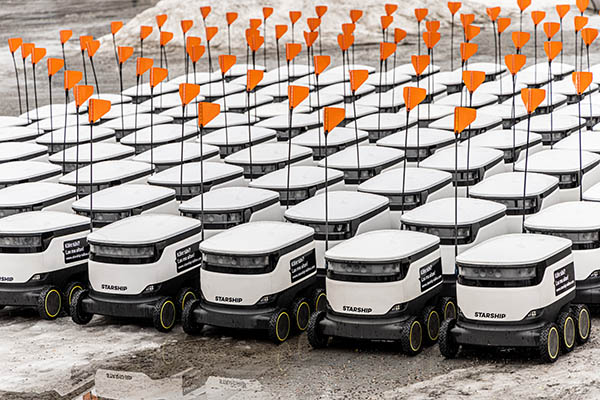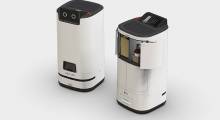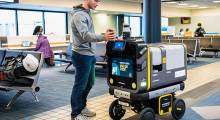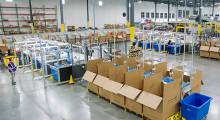Starship Technologies today announced that it has raised $100 million in the past 30 days, including a $42 million Series B round. The San Francisco-based company said it plans to use its funding to scale its robotic delivery service and meet increasing demand by launching in new cities and college campuses.
“The autonomous delivery market has been gaining momentum the past couple of years, and we think it will really take off this year,” stated Alastair Westgarth, CEO of Starship. “The demand for Starship’s services continues to rapidly increase, and we are regularly contacted by more college campuses and cities that want our services, often because they hear about the great results that Starship is already delivering.”
Last-mile deliveries are a well-known retail bottleneck that automation can solve, according to Starship. Ahti Heinla, former chief architect at Skype, and Janus Friis, co-founder of Skype, co-founded Starship in 2014. The company's zero-emission robots are designed to deliver food, groceries, and packages locally in minutes.
Autonomous deliveries proliferate
The global market for autonomous delivery robots will experience a compound annual growth rate of 20.4%, expanding from $17.13 billion (U.S.) in 2020 to $55 billion in 2026, predicted Facts & Factors.
Starship Technologies said its delivery robots make more than 100,000 road crossings every day and have traveled more than 3 million mi. (5 million km), more than any other autonomous delivery provider.
“We know this industry inside out, because we invented it,” said Heinla, chief technology officer of Starship. “So many unexpected things have happened to get us where we are today, but I think we can all agree that on-demand services are mainstream and not going away anytime soon. While other companies in this space are busy making claims, we are gladly very busy making thousands of autonomous deliveries every day and improving the efficiency of our service.”
The Starship Food Delivery app is available for download on iOS and Android. To get started, customers choose from a range of their favorite food or drink items, then drop a pin where they want their delivery to be sent.
The user can then watch as the robot makes its journey on an interactive map. Once the robot arrives, the customer receives an alert and can then meet the robot and unlock it through the app. Starship said it made 1 million deliveries last year.
Starship marks more milestones
Starship said that it tripled the number of deliveries it made in 2021 and that it “is continuing to gain momentum as the entire autonomous delivery industry expands.”
“I’m impressed with every member of our team who believes in what we are doing and has helped us hit yet another milestone of 3 million commercial deliveries,” said Westgarth. “I also appreciate the investors who trust our vision and who are helping us get to the next phase of our journey.“
The company also listed the following achievements:
- Operating more than 1,700 robots daily, which it claimed is the world’s largest fleet of autonomous delivery robots
- Launching service at new college campuses, including North Carolina Agricultural and Technical State University, Southern Methodist University, and South Dakota State University, with more to be announced soon
- Starting service in Pleasanton, Calif., through its grocery partner The Save Mart Cos.
- Achieving delivery costs that are now lower than the human equivalent, which the company said is “a world first for any robot delivery company,” since most others are still teleoperated by humans
- Extending its partnership with U.K. grocery partner Co-op with a commitment to launch in five new cities
- Doubling the size of its presence in Finland in 2021, with plans to double it again this year
- Reaching nearly four years of SAE Level 4 deliveries; on a daily basis, Starship said its robots complete numerous deliveries in a row and cross roads fully autonomously
Investors look to industry leadership
Starship Technologies said its latest investment, which includes €50 million ($57 million) from the European Investment Bank (EIB), doubles its funding and brings its total funding to $202 million. Series B investors included NordicNinja, Taavet+Stenn, TDK Ventures, and Goodyear.
“Everyone is talking about how to fix the issues with last-mile delivery,“ said Shinichi Nikkuni, managing partner of NordicNinja VC. “Time and again, Starship has proven itself to be years ahead of others with world-leading autonomous driving technology for sidewalk delivery, leading to accumulating more and more data and experiences through much wider commercial operations.”
“We have always been committed backers of the engineering ingenuity budding from the Estonian tech scene, and Starship takes this literally further than anyone—to the millions of miles around the planet these robots have already covered,” added Sten Tamkivi, investing with Taavet Hinrikus through their Taavet+Sten partnership.
“TDK Ventures is so proud of the rapid growth and success Starship has accomplished in a few short years,” said Nicolas Sauvage, president of TDK Ventures. “Our pride runs deep, as they were the very first investment we made.”
“With No. 1 industry positions today in a variety of metrics—number of paid deliveries, of autonomous robots, of kilometers driven, data and more—Starship continues to trailblaze the way,” he said.
Starship said it plans to use its funding to expand to “tens of new cities and campuses,” including the University of Tennessee, Knoxville, and the University of Idaho.
Article topics
Email Sign Up

















